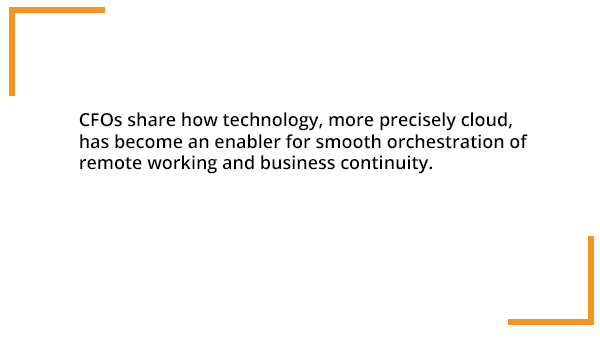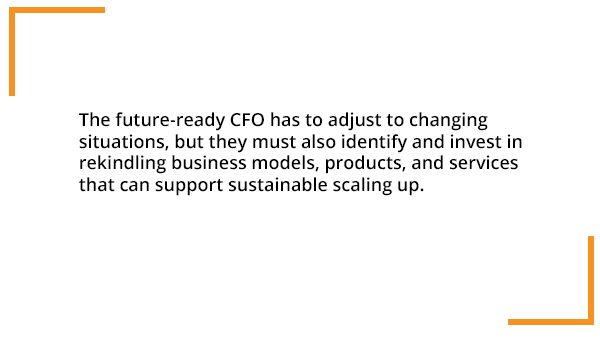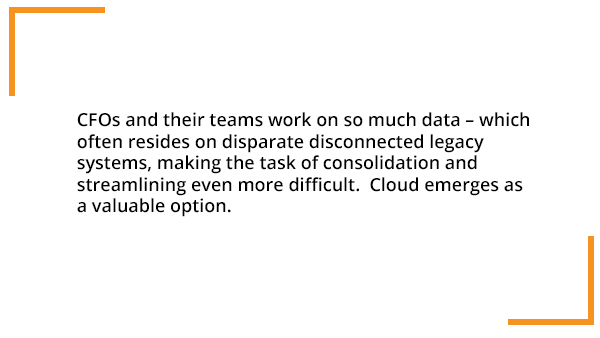
CFOs are gatekeepers of critical data to support business decisions for senior leaders. This includes access to data related to sales, supply chain, customer demand, business performance and real-time industry trends. Cloud technology can help finance leaders with flexibility, scale and increased data accuracy to make informed decisions. Probably it is time to consider this move!
Traditional office-goers are now sharing their office space with their spouses, kids or parents. Their new office is their home. In spite of the initial hiccups, people have adapted pretty well to the circumstances, finding their own sweet spots at their homes and turning them into dedicated office spaces. Meanwhile, the CFOs are taking notes!
As days go by, more and more businesses are starting to realize that technology is making it possible for them to get work done even without employees sitting in their offices. A recently published Gartner survey involving 370 CFO respondents states that 74% of CFOs expect to move previously on-site employees to remote work conditions.
We are witnessing a paradigm shift in work cultures and in the way businesses function. And technology is driving this shift.
Cloud technology has come to the forefront as businesses take the challenge of staying connected head-on. Designed to provide real time information delivery with enhanced transparency, cloud platforms like those offered by Oracle facilitate faster and more efficient business decision-making. For the end-customer, this means a hassle-free, seamless customer experience and unhindered service.

Companies with strong foundations of underlying technology within the organization were quick to respond to the challenges posed by the pandemic.
“In a span of 3 weeks we managed to achieve ~97% WFH for 3,000 people across the globe. We ensured they were up and ready for working from home to make sure they could smoothly service our clients,” said Rahul Malhotra, CFO, Integreon. “We tied up with an established cloud service provider for data security solutions which could be setup very quickly with literally no capex. This provided additional comfort to our clients and it also ensured ongoing service”, he added.
Business leaders have now been calling out Cloud as the Superhero because of its ability to enable people to bridge any communication gaps in spite of physical absence. Jatin Dalal, CFO and Senior Vice President, Wipro, stated “Our investments in technology helped us navigate the current dynamic environment. We were able to collaborate better with the government, customer and employees in enabling remote working for our employees through Cloud VDI- enabling their virtual desktops and VPN connections. Within our own organization, our chat messages between employees have increased by about 47%. Our collaboration minutes have gone up by 26%.”
Not every industry however can function unhindered without on-site employees. Take manufacturing for example, where most of the work happens inside a factory and only back-office work can be done remotely. However, a lot of big decisions, even for these firms are taken in board rooms- and real-time communication could be the key to better operations. Arvind Joshi, the CFO of Sandhar Technologies shares, “Upon the implementation of the Oracle ERP package, the company gradually moved all its operations on to a digital platform. What started with just the finance function, now encompasses Production Planning, Production, Supply Chain Management, Human Resources, Enterprise Asset Management, Product Life Cycle Management as well as the Industry 4.0 ! We realised much earlier, that in order to be nimble footed in our decision making, it was important that the flow of information from the shop-floor to the board room had to be in real-time.” As the virtual world takes over the physical world, Cloud technologies will take centre stage.

New technologies and new business models are forcing companies to innovate, adapt and transform to serve a digital, customer-first world. With technological innovations at an all-time high, rise of emerging markets, more empowered consumers and employees and active government intervention; traditional business models will face major challenges in the years to come. Therefore, the role of the CFO becomes crucial to manage disruption and a few ways to do that would be for them to identify and invest in new business models, products, and services, which can support sustainable scaling up.
“In times of uncertainty, it puts great demand on business leaders to take quick decisions. Plans made today may fall short of expectations and by the time they get implemented they may become outdated. Here in Sandhar, I am proud to say that it is the Finance department which takes the lead in business strategy with help of Cloud ERP. We believe we stand out as compared to firms relying on non-finance divisions to lead the way,” shared Arvind.
Oracle believes the CFO is the central character for successful digital transformation. All services should be aligned to help finance leaders become data leaders through hyper-connectivity.
“We are in the process of shifting our finance function to Oracle Cloud. It is convenient to use and visualise. It also makes transactional automation much easier,” shares Rahul Malhotra. To this Arvind Joshi adds, “I also believe it is cost-efficient and economically beneficial.”

The road however is not all smooth for CFOs. The finance function has had to face several challenges in order to truly embrace digital transformation.
“Some of the barriers that CFOs face in order to drive large scale transformations includes cost, getting the organization’s attention to what is important in the medium term, identify the right people to lead such transformations and change management. The present situation makes the task even more challenging,” points out Wipro CFO, Jatin Dalal.
A tough task for any organization is to unlearn past processes. CFOs and their teams work on so much data – which often reside on disparate disconnected legacy systems making the task of consolidation and streamlining even more difficult. Cloud emerges as a preferred solution to address issues ranging from data streamlining to unhindered communication, better collaboration to real-time decision making. Oracle Cloud services offer solutions that address all these issues.
“As cloud solutions continue to mature, offerings supporting core financial management applications are becoming more conventional, lean, agile and scalable. As the finance function moves ahead in our cloud journey, we would see transformed and innovative business processes using SMART technologies. We will able to support our business partners on a real time basis and this will be a game changer,” adds Jatin.
Cloud platforms provide real time information delivery with enhanced transparency facilitating efficient business decision making. For the end-customer, this means better customer experience and unhindered service.
“My expectations from this – streamline processes with minimalistic manual intervention resulting in lesser errors, inbuilt control checkpoints, less reliance on hardware being on cloud and finally generating human capacity to drive further initiatives. This versus getting bogged down with transactional activity,” sums up Rahul Malhotra, CFO, Integreon.
A major part of a CFO’s responsibility is to ensure relevant data is collected and analysed, and that the insight generated is distributed across business divisions as useful and actionable knowledge. A CFO needs to be more collaborative. This helps in effective business continuity planning.
The finance function can create value and elevate its role as a strategic business partner. Their training and experience equip them with the expertise and skills to mitigate risks and lead the recovery efforts for organizations, businesses and communities. Thus, they become an integral part of business continuity planning.
Their strategic overview is vital for meeting unknown demands and handling unknown situations.
However, the CFO is often hampered by outdated technology. In order to overcome these challenges, the finance function should consider shifting to a cloud model, which combines the options and capabilities of on-premise, private and public cloud technology across the entire business.
By making use of the agility, flexibility and reliability of Oracle cloud, CFOs can contribute towards business continuity planning for their organizations.